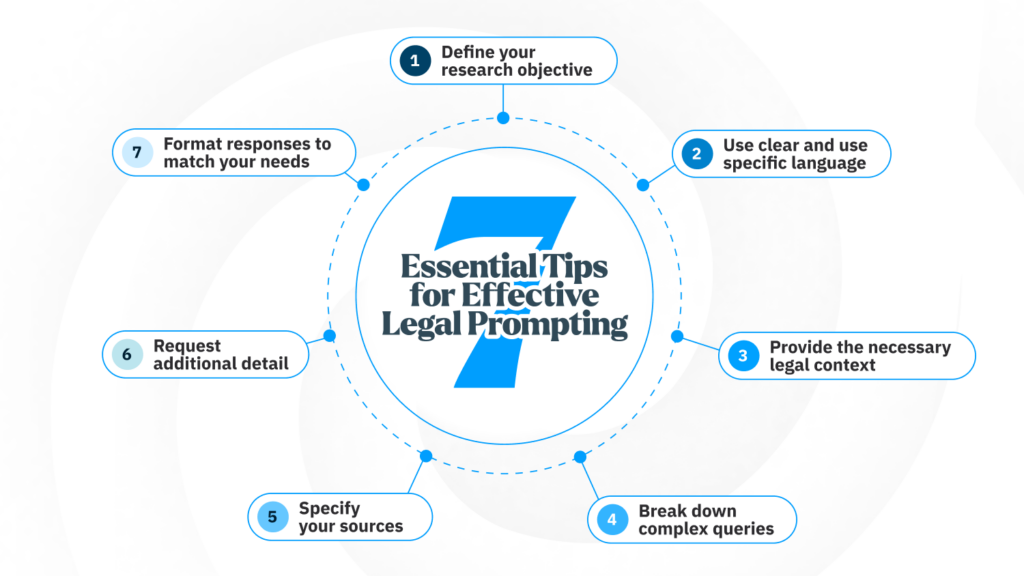THE AUTHOR:
Ushir Shah, Marketing Manager at Jus Mundi
Artificial intelligence is revolutionizing legal research, and Jus AI—powered by Jus Mundi—is at the forefront of this transformation. Legal AI tools enable professionals around the world to increase efficiency, enhance accuracy, and streamline workflows. But to extract the best insights from legal AI tools, knowing how to ask the right questions is key.

Here are seven essential tips for improving your legal prompting skills and getting the most out of AI-powered legal research tools:
1. Understand Your Objective
Before querying any legal AI, clearly define what you aim to achieve. A well-structured question leads to precise and relevant results. Having a clear objective allows the AI assistant to understand the context and generate responses that are aligned with your research needs. Without a defined goal, you may receive broad or unfocused results that require additional refinement, leading to inefficiencies in your workflows.
✅ Do: How are contract clauses interpreted by arbitral tribunals?
❌ Don’t: Look up information on contracts.
Why? General queries can generate broad responses, while specific ones yield targeted insights.
2. Be Clear and Specific
AI thrives on clarity. Vague or overly broad questions may lead to incomplete answers. Instead, be as detailed and precise as possible. The more specific your question, the more relevant and tailored the response will be. If the answer isn’t quite what you expected, rephrase your question to include key details, such as jurisdiction, legal framework, or case type. This will help AI tools generate more useful and targeted results.
✅ Do: What are the grounds for annulment of an arbitration award in France?
❌ Don’t: How to get an award annulled?
Tip: If the response isn’t what you expected, refine your prompt and try again.
3. Provide Context
Providing background details helps AI tools narrow down the scope and deliver more accurate answers. Contextualizing your query by including relevant facts, case details, or applicable rules ensures that AI understands the full picture. AI responds best when it has enough information to distinguish between different legal scenarios, so including contextual elements will lead to more comprehensive and insightful responses.
✅ Do: How may an arbitrator be disqualified under the PCA Arbitration Rules 2012?
❌ Don’t: What are the reasons for disqualifying an arbitrator?
Best Practice: If researching a case, mention relevant treaties, jurisdictions, or procedural rules.
4. Break Down Complex Prompts
If your query is multi-layered, split it into smaller, manageable questions for better results. AI tools function more efficiently when they can focus on one aspect of a complex issue at a time. By structuring your queries into step-by-step components, you can build a more structured and accurate response, ensuring that each aspect of your research is thoroughly addressed.
✅ Do:
(1) What are the common jurisdictional issues in international investment arbitration cases?
(2) What laws are typically applied in international investment arbitration?
(3) What procedural rules govern international investment arbitration involving multiple parties and states?
❌ Don’t: What are the jurisdictional issues, applicable laws, and procedural rules in international investment arbitration cases involving multiple parties and states?
Why? AI performs better when each aspect is addressed separately rather than lumped together.
5. Specify Your Desired Source
Many AI-powered legal research tools allow users to refine their searches by selecting only cases, rules, treaties, or publications. This improves relevance. If you need insights from a particular type of legal document, specifying the source ensures you receive the most authoritative and useful information. Filtering by source helps eliminate unnecessary results and makes it easier to focus on the most applicable legal precedents or doctrines.
✅ Do: Define the concept of competence-competence using publications.
❌ Don’t: Define the concept of competence-competence as done by authors.
Tip: If you need treaty interpretations, filter your query to focus only on treaties for the most relevant insights.
6. Ask for More Detail
If the initial response isn’t exhaustive, request additional depth or more examples to refine your understanding. AI-generated responses may provide a general overview at first, but you can always prompt Jus AI to delve deeper into specific elements. Asking follow-up questions or requesting further explanation helps in uncovering nuanced aspects of legal concepts, making your research more robust and thorough.
✅ Do: Go deeper. Tell me more about the objectivist approach to defining investment.
❌ Don’t: Stop at the first response if you need more clarification.
Tip: AI is a conversational tool—keep iterating on your questions until you reach the desired level of detail.
7. Request the Answer in Any Format You Need
Whether you need a legal memo, summary, or structured list, AI tools can format its response to suit your needs. Different legal tasks require different types of output, so requesting a specific format ensures that the information is presented in the most useful way. Whether you need a succinct summary for quick reference or a detailed memorandum for case preparation, AI can adapt its responses accordingly.
✅ Do: Draft a legal memo on the enforceability of arbitral awards under the New York Convention using this specific case.
❌ Don’t: I need to write a legal memo using this case to argue in favor of […]
Why? Specific format requests ensure AI tailors its output to match your requirements.
Get the Most Out of Jus AI
By following these seven essential tips you will be able to optimize the use of legal AI tools for your practice. You can see it in action in Jus AI – the only suite of AI Assistants tailor-made for arbitration doubling research, drafting, analysis, and translation efficiency with insights grounded in the world’s most comprehensive arbitration and international law database.
About Jus Mundi
Founded in 2019 and recognized as a mission-led company, Jus Mundi is a pioneer in the legal technology industry dedicated to powering global justice through artificial intelligence. Headquartered in Paris, with additional offices in New York, London and Singapore. Jus Mundi serves over 150,000 users from law firms, multinational corporations, governmental bodies, and academic institutions in more than 80 countries. Through its proprietary AI technology, Jus Mundi provides global legal intelligence, data-driven arbitration professional selection, and business development services.
Press Contact
Helene Maïo, Senior Digital Marketing Manager, Jus Mundi – [email protected]





